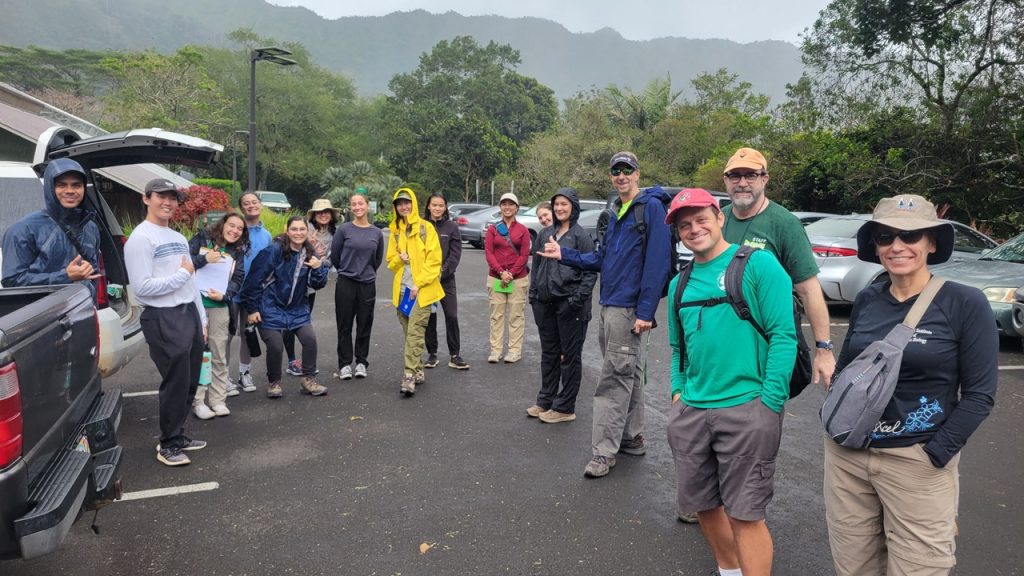Casey Wandasan (Earth Sciences major), a UROP Project funding recipient, worked alongside his mentor, Dr.…
Featured Opportunity: NSF-IRES in the Galápagos
Starting in the summer of 2024 and recurring annually through at least 2026, UHM undergraduate students will get the chance of a lifetime to explore their passion for research and develop a foundation in environmental stewardship, pono science, and the principles of mālama ʻāina. The National Science Foundation—International Research Experiences for Students (NSF-IRES) in the Galápagos combines indigenous and western science over two semesters, and culminates each summer in a fully paid research trip to the Galápagos Islands in partnership with the Charles Darwin Foundation.
The research focus of this program is the field of island invasion biology in the Pacific, including the impacts of invasive species on the Pacific Islands’ unique ecosystems and cutting-edge options for managing them. UROP Director Creighton Litton, a professor in the Department of Natural Resources and Environmental Management and one of the PI’s of the cross-campus and multidisciplinary team leading the NSF-IRES project, stated, “The parallels between Hawaiʻi and Galápagos are remarkable, both in terms of their biology and geology, but also the threats that native species and ecosystems face today such as the introduction and spread of invasive species. As such, participating students will be able to bring and apply the knowledge and experiences gained in Galápagos back home to Hawaiʻi.”

Each annual iteration of the program begins with a four-credit Spring semester course that combines lectures with laboratory work to provide students with a foundation for research in the Galápagos, with focus on both Indigenous and Western science. Taught by Litton and Dr. Kiana Frank, Pacific Biosciences Research Center, with guest lectures by UHM faculty and scientists from the Galápagos and across the world, the course is designed to equip students with the knowledge and skills essential for understanding the complex challenges posed by invasive species in tropical island ecosystems. Special attention is given to the unique cultural and ecological context of Hawaiʻi, including place-based indigenous resource management, while connecting Hawai‘i’s environment to the broader global context of invasive species research. “Our intentional approach aspires to expand students’ thinking beyond convention and instill within them the kuleana (responsibility) to address future ecological challenges in the Galápagos, Hawaiʻi, and other island systems with creativity and adaptability, mirroring the wisdom of our kūpuna (ancestors).”
Of the close to 100 students who applied for the program in Fall 2023, twelve were selected for the Spring course, and eight will get the chance to spend eight weeks during the summer conducting research in the Galápagos in close collaboration with research scientists from the Charles Darwin Foundation. Student invasive species projects will focus on ongoing, long-term research in Galápagos in the fields of marine biology, botany, and ornithology/entomology. “Getting to spend eight weeks in the Galápagos is itself a remarkable opportunity. But more than just being there, these students will have the chance to engage in real-world research that will inform the ecology and management of endemic organisms and ecosystems that are part of the remarkable biodiversity of these islands.”
Following their return to UHM in the Fall 2024 semester, participating students will be encouraged to continue working with their mentors on campus and from the Galápagos to finalize and publish their research. The program’s final goal is not only to develop the next generation of ecologists’ capacity for scholarly inquiry, but also to expose them to the ethics and innovative potential of indigenous ways of knowing, aloha and mālama ‘āina. “By embracing the values of moʻokuauhau (ancestral connections), kaikuaʻana and kaikaina (mentoring relationships), kuleana (responsibility), mālama ʻāina (environmental stewardship), and hānai and hoʻomalu (care and protection) we hope to empower the next generation of ecologists by cultivating transformative experiences that ignite innovative problem-solving and foster a legacy of pono (responsible) stewardship for our future.”
The NSF-IRES in the Gálapagos program is jointly sponsored by the National Science Foundation, the UHM Provost’s Office, and the UHM Vice Provost for Research and Scholarship office. Eight or more students will receive the opportunity to participate in the full suite of activities in both 2025 and 2026. Ultimately, the goal is to continue to provide these immersive research opportunities in Galápagos for years to come beyond 2026, providing unique learning experiences for UHM undergraduate students and strengthening the research collaboration between UHM and the Charles Darwin Foundation.
